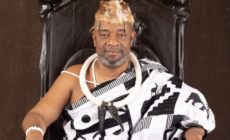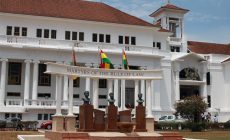No pension for dismissed High Court judge – Supreme Court
- Posted on
- Comment
 A former High Court judge who was jailed in 2013 for investing over $50,000 meant for a litigant and profiting from the proceeds has had his claims for pension dismissed by the Supreme Court.
A former High Court judge who was jailed in 2013 for investing over $50,000 meant for a litigant and profiting from the proceeds has had his claims for pension dismissed by the Supreme Court.
In a judgement, a seven-member panel of the Supreme Court, presided over by the Chief Justice, Ms Justice Sophia Akuffo, stated that the judge, Justice Edward Boateng, had no legal basis to lay claims to any pension.
“Our response concerning the plaintiff’s (Justice Boateng’s) conviction after retirement and his entitlement to pension is that he is not entitled to gratuity and pension,’’ the court held.
The judgement was read by Mr Justice Sule Gbadegbe. Other members of the panel were Mr Justice William Atuguba, Mrs Justice Sophia Adinyira, Mr Justice Jones Dotse, Mrs Justice Vida Akoto-Bamfo and Mr Justice Gabriel Pwamang.
Conviction and sentencing
Justice Boateng, a former High Court judge at Denu in the Volta Region, connived with a former Registrar of the court, Jacob Dickson Owusu, and invested the money for their own benefit between 2000 and 2002.
The money was a compensation meant for a litigant in a land case brought before Justice Boateng.
On July 19, 2013, the Accra High Court, presided over by Mr Justice Charles Quist, convicted Justice Boateng and Owusu and sentenced them to nine months and one year imprisonment, respectively.
The court found them guilty of conspiracy to commit fraudulent breach of trust, conspiracy to steal and stealing.
The former High Court judge was convicted and sentenced while he was on retirement. (He retired on December 11, 2011)
Prior to his conviction, Justice Boateng was interdicted by the then Chief Justice, Mr Justice George Kingsley Acquah, on May 10, 2005, and he was immediately charged with the offences.
As a result of his conviction, he was stripped of all the gratuity and entitlement meant for a retired justice of the Superior Court as stipulated by Article 155 (1) of the 1992 Constitution.
According to Article 155 (1) justices of the superior court retire on their salary in addition to other benefits.
Legal battle for pension
Stripped of the retirement package, the convicted judge has been battling the Judicial Service, the Judicial Secretary and the Attorney-General in court, with the aim of getting his pension.
He initiated the action at the High Court but on November 17, 2016, the High Court referred certain constitutional aspects bordering on the impeachment and the gratuity enjoyed by justices of the superior court to the Supreme Court for interpretation.
The specific constitutional provisions referred were Article 146(10), which stipulates how a superior court judge can be removed, and Article 155 (1), which borders on the retirement package for superior court judges.
In their argument before the court, lawyers for Justice Boateng had argued that the former High Court judge was on retirement when he was convicted, and, therefore, he was entitled to his retirement package, notwithstanding the conviction.
His legal team further argued that the former judge was not interdicted on the authority of the President, who appointed him, but rather the Chief Justice, through the Judicial Secretary, who wrote the letter of interdiction.
It was their case that Justice Boateng’s interdiction breached Article 146(10), and consequently was unconstitutional, null and void, and of no effect.
Supreme Court reasons
But the Supreme Court was of the view that Justice Boateng, although retired on December 11, 2011 and convicted on July 19, 2013, was interdicted on May 10, 2005 after he was charged with the offences.
In view of that, the court held that the former judge never retired from service, because his service was brought to an end when he was interdicted.
“Having been convicted of the offence, it meant that as of the date of his interdiction, his continuous service was brought to an end by an act that rendered him unqualified to continue to hold the office of a High Court judge.
“In our view, from the date of the interdiction, he was not in continuous service and, in order to qualify for pension as envisaged in Article 155 (1), he would have to be restored to continuous service by virtue of his acquittal for the offence he was charged,’’ the court held.
On the issue of the validity of the interdiction, the apex court held that the Chief Justice and the Judicial Secretary did not breach any constitutional provision.
The Chief Justice, the court held, “can interdict a Justice of the superior court on the presumed authority of the President”.
Background
The Government of Ghana awarded a contract to Great Lakes Dredge and Duck Company Limited in 2001 to construct the Keta Sea Defence at Keta and its environs.
The company acquired land from the inhabitants of Keta and established a stone quarry from which chippings and other construction materials were produced for the project.
When Great Lakes Dredge and Dock Company Limited completed its work a dispute arose between two families as to the compensation for the use of their land for the project.
This resulted in a legal case brought before the Denu High Court, presided over by Justice Boateng, in a case titled ‘Togbui Yao Awlime and another versus Mama Agbowugbe and two others.’
The company paid US$50,754.9 as compensation to other parties in the litigation, which was in turn paid into the account of a bank on the orders of Justice Boateng
Justice Boateng and Owusu, the Registrar, opened an account at the Denu branch of ADB into which the US$50,754.9 was lodged in the name of Owusu.
The money was subsequently converted into cedis and on October 16, 2007, the account holder (Owusu) withdrew GH¢35,000 from the account and invested it into a fixed deposit account at the same bank (ADB).
Justice Boateng was transferred from Denu to the Sefwi Wiawso High Court in the Western Region and replaced by Mr Justice Benuyena Benson, who ordered Owusu to render a statement of account on the money he had lodged with the bank at Denu, but he (Owusu) did not comply with the order.
The Judicial Service sent Mr Prosper Adeti, Director of Finance at the Head Office, Accra, to Denu to audit the US$50,754.9 lodged with the bank by the registrar.
It was this audit and subsequent investigations that revealed that Justice Boateng and Owusu had invested the money for their own benefit.
-Graphic










 (Selorm) |
(Selorm) |  (Nana Kwesi)
(Nana Kwesi)